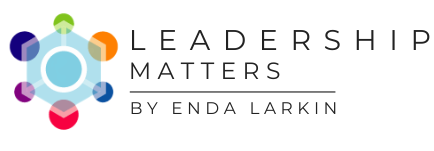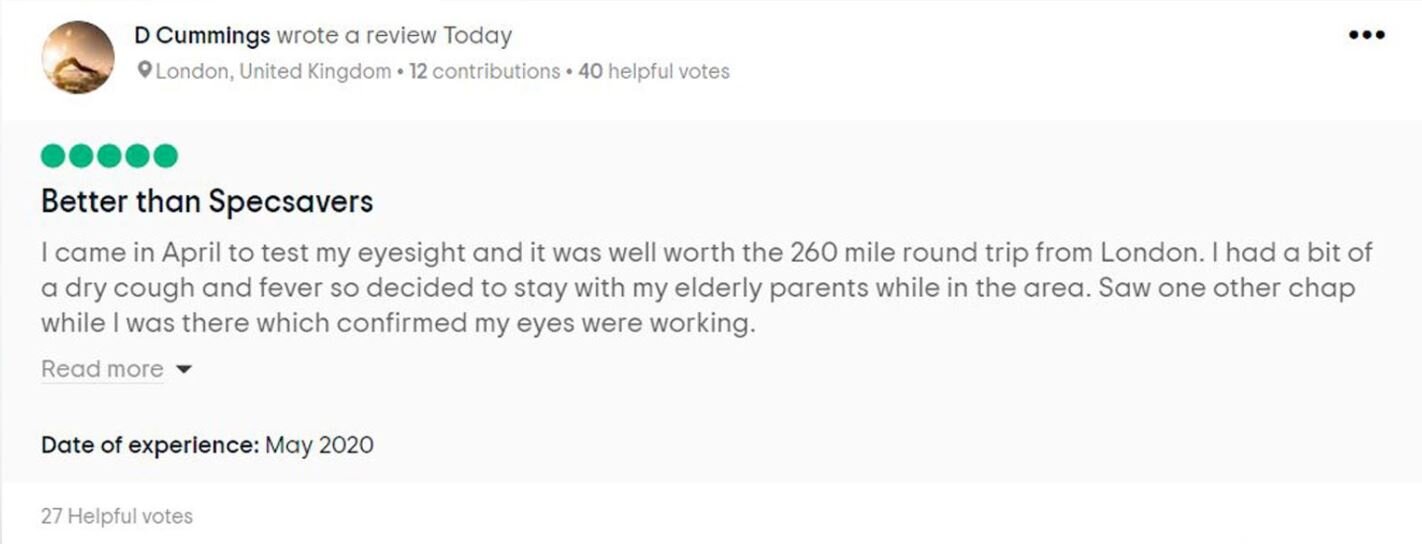"Better than Specsavers" … how will businesses manage compliance with COVID-19 protocols?
This was a spoof review posted recently on Barnard Castle's Trip Advisor page. Trip Advisor has since suspended reviews for them due to the sheer volume of similar fake posts. For those not in the know, Dominic Cummings, a senior advisor to British Prime Minister Boris Johnson, was recently accused of breaking UK lockdown rules by driving from London to Durham to stay with family. Whilst in the area, he was reportedly seen at Barnard Castle ( a local attraction) and when subsequently asked why, he said he drove there 'to test his vision' before undertaking the longer trip back to London.
You could not make it up.
Whatever your thoughts on that specific incident, it is not the topic of today’s post. Rather, my focus here is on the wider subject of the challenges that the enforcement of COVID-19 protocols will place on owners and managers in customer-facing businesses. Whilst most of your reopening efforts at present are rightly concentrated on putting in place the necessary measures to get the doors open again, from a management perspective there is an issue coming down the tracks that is only starting to get attention, and that is how will your employees will respond to customers that refuse to adhere to COVID-19 protocols? Here is a simple example of what I mean.
This morning whilst on the way to work, I stopped to grab a coffee as usual. At the entrance to the shop, there’s a sign saying no more than 3 people in the café at a time. There was already three inside, so I joined the queue outside behind the two people already there. As we waited, another guy came along and just marched past the three of us and into the store. The employee said he had to wait outside, and the pleasant response was “F**k you, I just want a coke and I’m not waiting 20 minutes for it.” The guy then grabbed a bottle from the fridge and tried to pay. The employee refused to serve him, and then the manager got involved. At this point the man at the front of the queue waiting to get in also got involved and threatened the guy that he would ‘rip your f**king head off if you don’t let me get my coffee” and it turned into a big shouting match which meant nobody could get served. This went on for quite some time with the guy refusing to budge and apparently the police were called. I had to run for a call so I couldn’t wait around to see the conclusion of the incident, but needless to say I didn’t get my coffee. That’s Dublin folks!
Anyway, I raise this issue not a a whinge about my lack of a morning coffee but rather to highlight a problem that will become more prevalent for customer-facing employees. We are already starting to see more of these types of incidents so it will be important that owners and managers are clear on what the policy is, and how it should be enforced, and that this is then effectively communicated to employees.
Lessons from the Spanish Flu Epidemic
On the wider issue of how people react to impositions placed upon them, it is useful to look back to see how people reacted during the Spanish Flu epidemic over a century ago. One interesting academic study I came across[i] looked at lessons that might be drawn from how people reacted to the Spanish Flu epidemic. They found many interesting reactions that we see repeated today, both in terms of how the pandemic was managed, and in peoples’ responses to the various restrictions placed upon them. As with COVID-19 today, the measures used to contain the Spanish flu back then significantly impacted on day-to-day life and , as now, some people accepted those impositions whereas others did not.
The researchers specifically looked at how the twin cities of Minneapolis and St. Paul in the United States responded to the Spanish Flu pandemic comparing the actions taken. They found some differences between the overall approaches adopted by the two cities (one more proactive, the other reactive), but without getting into too much detail on that side of things, it is on the reaction to certain measures imposed that I want to focus here. In no particular order, here’s some examples they cited:
As now, there was huge debate about the closure of schools and even when a closure order was issued, some schools did try to reopen and had to be forcibly shut down.
When sporting fixtures were subjected to bans, some sports teams just flouted the ban to the point where police were called to disperse the crowds.
Although hospitality enterprises were subject to closing orders, some businesses deliberately ignored the regulations and continued to serve food and alcohol.
The use of elevators was banned, but the reaction from hotels was so strong against this measure – as it would deter guests, they argued – this prompted a change in the ruling to allow hotels to operate elevators.
Even the subject of quarantine and self-isolation caused problems and doctors and patients were found to be ignoring the mandatory reporting rules so as to avoid being quarantined.
And yes, the same debate about the wearing of face masks also raged then too!
So, the first thing we learn from studying history is that we humans are nothing if not predictable. When faced with similar scenarios 100 years apart, we are seeing very the same debates and reactions about how we respond to restrictions placed upon us. We evolve slowly.
How will businesses enforce COVID-19 protocols?
However, the second - and more important - reason for raising the issue today is to highlight the challenges ahead for you in terms of dealing with customer reactions to the variety of protocols enforced. Initially, when COVID-19 first hit, the ‘we are in this together’ mindset made the introduction of containment measures relatively smooth, and people have largely stuck to them. With the passing of time, and as the fear factor diminishes, the collective cohesion is diminishing and will continue to do so – especially as we all ramp back up our stress levels.
This poses many challenges for customer-facing businesses. On the one hand, enterprises that do not comply with new safety protocols aimed at preventing the spread of Covid-19 are being told they could suffer serious consequences, including shut down, depending upon the local regulatory regime. For owners and managers, ensuring that employees adhere to relevant protocols should be straightforward enough but from a customer perspective it is going to be far more challenging. As the incident this morning highlights, the business enforced the protocol, but through no fault of their own probably lost some business in the process. And certainly it was unnecessarily stressful for the staff involved.
It is worth highlighting that potential scale of this problem will not be insignificant either. Even in Ireland, where compliance to date has been high, it is worth noting some official statistics from 8 April (when the restrictions on movement came into effect) to May 23:
Police have invoked the regulations 263 times. These include both arrests and incidents without arrest.
There were 80 incidents of spitting and/or coughing against police
Police had to use anti-spit guards 60 times.[ii]
In the UK, again where overall compliance levels were good, and the British tend to be law-abiding by nature anyway, there have been 14,000 fines issued for alleged breaches of lockdown laws.[iii]
Now, let me be clear, I am not trying to be dramatic or alarmist in raising any of this. I am simply trying to highlight that, amongst the many other factors you will have to contended with as you reopen, you will have to deal with the non-compliance issue, to a greater or lesser degree. The first requirement is that any protocols imposed must actually be enforceable in the first place, so regulators need to be practical in what measures they define. And on that basis, once you have addressed the pressing concern of what measures must be put in place in order to reopen your doors you will need to give serious consideration to how any breaches of the set protocols by customers are going to be addressed. This will entail:
Being 100% clear on what the relevant customer-facing protocols are in relation to your business?
What is the legal standing of these protocols, are they mandatory or recommended?
What will the employees’ role be in enforcing these measures?
How should they respond to breaches?
How can disruption to compliant customers be minimised whilst the non-compliant individual is dealt with?
How can situations be prevented from escalating to the point where other customers get involved?
What training may be required to help employees cope with the potential scenarios that may arise?
These may seem somewhat trivial concerns when there’s so much else to be done to reopen, but they will matter a lot when you do start trading again and dealing with errant customers. Additionally, you should remember that in this world where every minor incident is captured on video by someone and then posted online, you want to ensure that you, your employees and the reputation of your business is protected.
Thanks for reading!
[i] Lessons Learned from the 1918–1919 Influenza Pandemic in Minneapolis and St. Paul, Minnesota
Miles Ott, AB, Shelly F. Shaw, MPH, Richard N. Danila, PhD, MPH, and Ruth Lynfield, MD
[iii] https://www.bbc.com/news/uk-52674192

